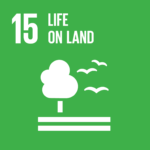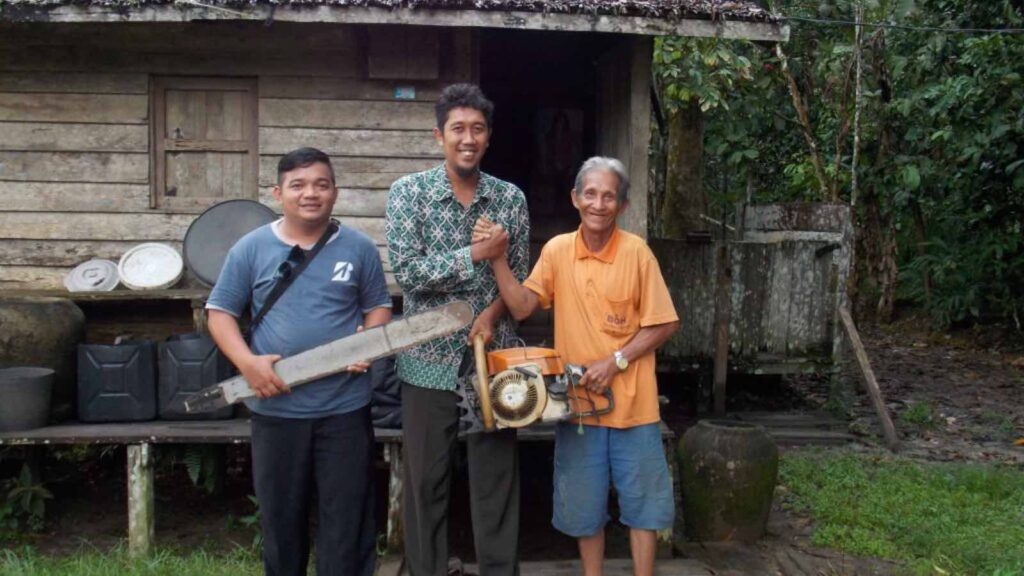Once blanketed in lush rainforests, the Southeast Asian island of Borneo is now fighting a battle against deforestation. Health in Harmony (HIH) has launched a groundbreaking initiative that’s turning the tide on illegal logging through an unlikely tool: chainsaw buybacks.
Since 2017, Health in Harmony (HIH), known locally as Alam Sehat Lestari (ASRI), has been running a chainsaw buyback program aimed at transforming the lives of farmers and small-scale loggers in Borneo. Farmers who once depended on illegal logging to make ends meet are now being offered cash for their chainsaws—along with financial support to establish alternative livelihoods. In exchange for turning in their chainsaws, these loggers receive around $200, plus up to $450 to help them start businesses in organic farming, beekeeping, or retail.
RELEVANT SUSTAINABLE GOALS




But this initiative doesn’t just stop at financial compensation. It tackles the root causes of illegal logging: poverty and the lack of access to healthcare. “Many farmers turn to logging because they need quick cash for healthcare,” explains Mahardika “Dika” Putra, conservation program manager at HIH. “By offering high-quality, affordable healthcare and alternative sources of income, we’re helping them live in harmony with the forest.”
Trading Chainsaws for a Future: A Holistic Approach
HIH’s success lies in its holistic approach to conservation, working with communities near Gunung Palung National Park—a protected area on the Indonesian side of Borneo where illegal logging has been rampant. In 2007, a door-to-door survey found that over 1,400 households in the area were dependent on logging for their income. To address this, HIH not only introduced the buyback program but also opened a medical center in the same year, which has been instrumental in shifting the economic dependence away from logging.
The HIH medical center provides critical healthcare services, and villagers can even pay for care with seedlings, manure, or rice husks, which are reinvested into reforestation and sustainable farming projects. This innovative payment system has led to a 67% drop in infant mortality in the area while providing tangible incentives for communities to protect the forest.
Additionally, the medical center offers discounts to villages that reduce illegal logging, linking better healthcare with better environmental outcomes. A 2020 study from Stanford University found that deforestation in the region had dropped by 70% in the decade after HIH’s programs began—equivalent to protecting over 27 square kilometers (10.6 square miles) of rainforest.
Chainsaws Down, Trees Stand Tall
The results of HIH’s chainsaw buyback program have been staggering. Since 2017, 279 loggers have handed in their chainsaws, protecting an estimated 107,000 trees, including 15,000 old-growth trees. Household logging has decreased by 90%, a remarkable achievement in an area where small-scale logging has historically been a major contributor to deforestation.

However, while the buyback program has made a significant impact, challenges remain. The lucrative palm oil industrycontinues to pose a serious threat to Borneo’s rainforests. Some former loggers, tempted by the potential for high profits, have turned to growing palm oil on their rice paddies. But without proper knowledge, this switch can lead to environmental and economic disaster. Palm oil requires large amounts of water and chemical fertilizers, which can degrade the soil and pollute local water sources. The result? Ruined farms, diminished incomes, and devastated ecosystems.
To combat this, HIH runs community education programs to inform farmers of the long-term consequences of growing palm oil and encourage more sustainable agricultural practices. By training farmers in organic farming and sustainable land use, HIH helps communities avoid the traps of monoculture farming while ensuring that they can still grow food and earn a living.
A Model for Global Conservation: Empowering Local Voices
HIH’s innovative approach has garnered international attention. In 2022, the organization won the prestigious Ashden Award for Natural Climate Solutions, and in 2023, it was named a top Innovator in the World Economic Forum’s Forest and Health Challenge. These accolades are well-deserved, as HIH’s work represents a groundbreaking blend of environmental conservation, healthcare access, and community empowerment.
“Health in Harmony demonstrated how valuable rainforests are for indigenous communities,” said Jacquelyn Francis, founder and executive director of the Keeling Curve Prize, another award HIH received for its social and cultural pathways to addressing climate change. “Their name says it all: there is more climate health when it is in harmony with natural systems.”
The buyback program has been praised for its “win-win” conservation model, which protects both the environment and the livelihoods of local communities. Dr. Skylar Hopkins, an assistant professor at North Carolina State University and an expert on conservation, notes that grassroots organizations like HIH are crucial to the success of such initiatives. “Scientists often don’t understand how these programs impact local communities. That’s where NGOs like HIH step in—they bridge the gap between research and real-world solutions,” Hopkins said.
At the core of HIH’s mission is a simple but powerful principle: listening to local communities. “We’re not deciding for them,” says Putra. “We’re changing the way we support them, recognizing their voices and helping with what they need most.”
Lead image courtesy of Health in Harmony
You may also be interested in :
Conservation Efforts Prove Effective in Reversing Biodiversity Loss, Landmark Study Finds




